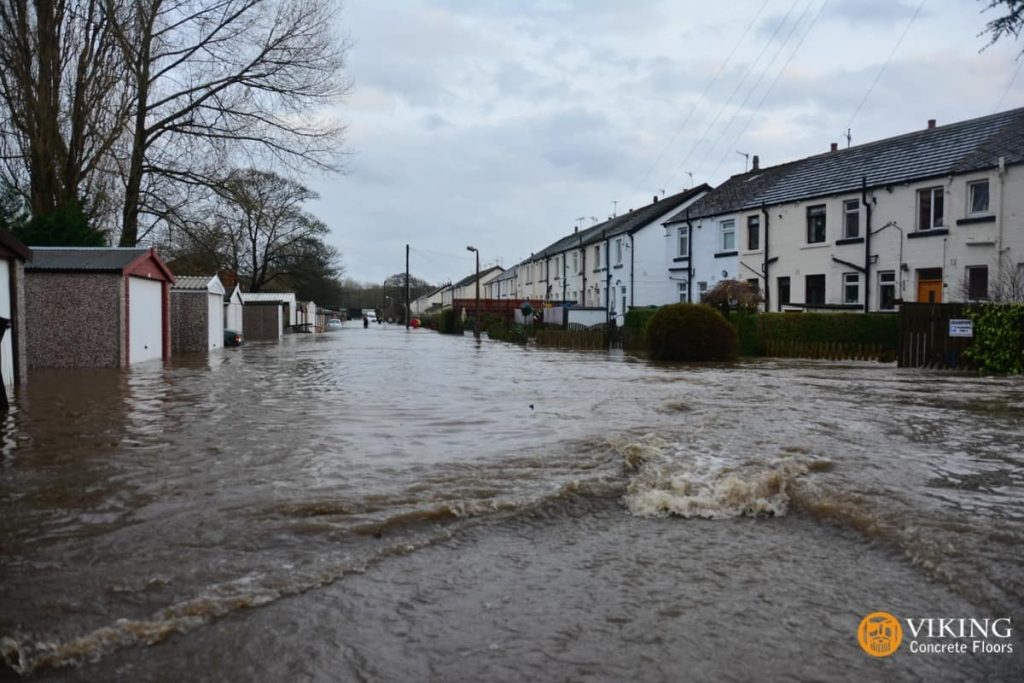Due to the numerous storms and hurricanes that have ravaged many regions and countries recently, we’re reminded of the tremendous damage flooding can cause and the impact on businesses, homes, and communities that are left to replace and repair water damaged environments.
Flooding is an appalling experience that has costly and long-term consequences for all those involved. The flood damages from Hurricane Harvey alone are estimated to be several billion dollars.

In light of this, we’ll specifically investigate the damage caused by flooding to concrete flooring. Despite being overlooked, the floor is the most crucial area for any business. It is the platform where customers browse, trade, and buy, the solid foundation on which machines whirr, products are made, and employees work, and it is one of the most likely areas to be damaged in flood.
Even after a short exposure period, floodwater will wash over, corrode, stagnate, and potentially ruin the floor finish. As the water rises through the sewer system, it brings all the bacteria and sanitary issues associated with sewer waste. Floating water also comes from waterways like creeks, rivers, and bayous, carrying silt and mud from runoff and creating sanitation issues after the water recedes.
As a result, it’s crucial to plan and prepare as much as possible in advance and know how to deal with the consequences once they have occurred. This article discusses the best way you can protect your concrete flooring from flood damage.
Water seeping through your concrete flooring in the basement or garage leaves your house susceptible to bigger problems. Mold and mildew can grow in this water, affecting the structural integrity of your home. With constant exposure to moisture, a small crack in your concrete flooring can become a big problem, allowing insects and outside elements to enter your house.
Our concrete flooring company recommends concrete sealing as preventative maintenance for your home. The key to maintaining your home’s indoor air quality and the foundation is to take care of your concrete flooring before you experience a problem (or larger problem).
Sealing a concrete flooring the right way requires four steps: 1) finding the appropriate sealant, 2) cleaning the surface, 3) repairing cracks, and 4) applying the sealant.
Follow these instructions below for a quality seal:
There are many types of concrete sealers, so you should choose the one that is best for your project. Give our concrete floor company a call if you need help finding the right sealer.
Make sure your concrete floors (or walls) are thoroughly cleaned before sealing. Here is how:
Once your concrete flooring is clean and dry, look for any cracks or holes. Use a washable cloth or towel to smooth out the concrete repair caulk on them. Allow the caulk to dry according to the manufacturer’s instructions.
After choosing your sealant and preparing your surface, it’s time to apply it. The following steps will help you successfully seal your concrete flooring in and near Prairieville, LA.
In case you didn’t get to seal your floor before the flood damage, don’t worry. You may still save it if you act fast. Here is how to repair your concrete flooring in and near Prairieville, LA:
It is possible for concrete to get wet, but it shouldn’t stay wet. Concrete can crack and may cause damage to items or floor coverings installed over it if you let it wait for a long time.
Instead, follow these 3 professional steps to dry wet concrete in your home:
Getting rid of standing water is the first step. There are a variety of approaches to this depending on the severity of the flood damage to your concrete flooring in and near Prairieville, LA.
If the leak is small and seasonal, you can use towels and other absorbent materials to soak up the water. If the problem is large, the area may need to be dried out using a sump pump or similar device.
It will help pull moisture from surfaces and the air and dry the affected area more quickly and thoroughly if you install a dehumidifier. Concrete walls are particularly at risk of dampness.
One of the biggest problems in wet concrete is that water-based adhesives will not stick to it until it dries. It is difficult to fix any leaks in the walls, and you are at risk for further flood damage.
Whenever the humidity of a room exceeds 50%, a dehumidifier is a great idea. If you don’t own a dehumidifier, you can rent one from a contractor’s warehouse or buy one at a local home goods store.
The above two steps should be followed regardless of how severe the concrete flood damage appears, but you should also hire a professional restoration company.
The reason is simple: concrete components are the foundation of your home. It puts the structural integrity of your house at risk if they become weak, cracked, or swollen.
With this in mind, contact a professional concrete flooring company before the worst happens. Viking Concrete Floors can bring new life to your home. With our services, never worry about water damaging your concrete flooring. We are your one-stop-shop for all your decorative concrete projects in Prairieville, LA. Call now at (225)-313-7950 for a free estimate!
If this post was helpful to you, please leave us a 5star review. It would help us a lot. Thanks!